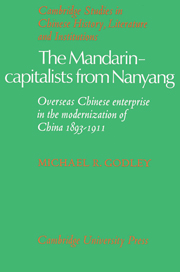 The Mandarin-Capitalists from Nanyang
The Mandarin-Capitalists from Nanyang Book contents
- Frontmatter
- Contents
- Dedicated to Marilyn, Heather and David
- Preface
- Note
- Map
- Introduction
- PART I THE RISE OF THE OVERSEAS CHINESE CAPITALIST
- 1 The foreign experience
- 2 Environment and Chinese values
- 3 China's discovery of the Nanyang Chinese
- 4 The recruitment of Chang Pi-shih
- PART II OVERSEAS CHINESE ENTERPRISE IN THE MODERNIZATION OF CHINA
- Epilogue: Old faces in a new government
- Notes
- Select Bibliography
- Glossary
- Index
3 - China's discovery of the Nanyang Chinese
Published online by Cambridge University Press: 23 September 2009
- Frontmatter
- Contents
- Dedicated to Marilyn, Heather and David
- Preface
- Note
- Map
- Introduction
- PART I THE RISE OF THE OVERSEAS CHINESE CAPITALIST
- 1 The foreign experience
- 2 Environment and Chinese values
- 3 China's discovery of the Nanyang Chinese
- 4 The recruitment of Chang Pi-shih
- PART II OVERSEAS CHINESE ENTERPRISE IN THE MODERNIZATION OF CHINA
- Epilogue: Old faces in a new government
- Notes
- Select Bibliography
- Glossary
- Index
Summary
EMIGRATION AND THE EARLY COOLIE TRADE
The Chinese government had not always displayed great concern for its overseas subjects. The Manchu conquerors of China inherited a general Confucian revulsion against those individuals who dared to forsake family obligations in order to search for wealth in far-off corners of the earth. The Ming dynasty, like its successor, actually forbade its subjects to go abroad. Those who ignored the prohibition and chose to leave home generally did so as a last resort, when the pressure of population growth or natural disaster left no viable alternative save banditry and rebellion. Indeed, it was not at all uncommon for those who ultimately sought refuge outside of China to have already tried the route of insurgency before they fled southward. There was, therefore, more than ample reason for the Confucian Ming rulers to view the sojourners abroad as yu-min, unproductive vagabonds who would not be missed. The prohibition was, thus, somewhat relaxed in its application to permit potential trouble-makers to find self-imposed exile.
During the transition from Ming to Ch'ing, the new rulers of China, in their effort to extinguish rebellion in the southern coastal region, more actively enforced the earlier regulations assuming that emigrants might plot the overthrow of the Chinese government from the safety of a foreign base. The famed rebel Koxinga who occupied Formosa and made frequent attacks along the Fukien coast to embarrass the Manchus helped reinforce Confucian attitudes and Ch'ing suspicions.
- Type
- Chapter
- Information
- The Mandarin-Capitalists from NanyangOverseas Chinese Enterprise in the Modernisation of China 1893–1911, pp. 60 - 78Publisher: Cambridge University PressPrint publication year: 1981


